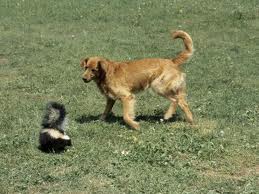“YOU WILL GET THE BEST, MOST THOROUGH, PROFESSIONAL SERVICE YOU HAVE EVER SEEN…I GUARANTEE IT.” – PAUL BAUMEISTER, OPERATOR
 The striped skunk is about the size of an adult house cat and its fur is mostly black with white on top of the head and neck. In most animals the white extends down the back, usually separating into two white stripes. Spotted skunks are black with white spots or short white streaks. They are smaller than the striped skunk, about half the size of a house cat.
The striped skunk is about the size of an adult house cat and its fur is mostly black with white on top of the head and neck. In most animals the white extends down the back, usually separating into two white stripes. Spotted skunks are black with white spots or short white streaks. They are smaller than the striped skunk, about half the size of a house cat.
Skunks are nocturnal, hunting at night for insects, grubs, small rodents, snakes, frogs, mushrooms, berries and fruit, pet food, bird food, and garbage. Skunks have a high preference for eggs and, as a result, ground-nesting birds suffer losses.
Management
Because rabies is endemic in the skunk population, some city or county health departments assist in the control of skunks by providing trappers to remove them from residential areas. The skunk’s propensity to spray their musk-laden spray is sufficient to make them unwelcome visitors, especially in close proximity to homes. Several actions can be taken to make gardens, yards, and residences less attractive to skunks.
Detection
Because they are usually active only at night, many people never see skunks as they travel through their neighborhoods or yards. Barking dogs may be the first apparent sign of their presence, and the odor resulting from a skunk/dog confrontation will provide positive evidence. If skunks repeatedly travel through your yard or garden, sooner or later you will detect a faint skunk odor, even if the skunk has not sprayed. As with raccoons, an occasional visit by a skunk or a family of skunks may not be cause for concern, but if these visits become commonplace, some action is probably warranted. During the breeding season, males frequently spray when fighting over females. The presence of these odors in late winter is a signal that skunks might be nearby and that it could be necessary to take appropriate measures to prevent pregnant females from accessing potential nesting sites underneath buildings.

Dogs are always prone to being sprayed or bitten by skunks.
Skunk Bites
Rabies, an infectious disease caused by a virus organism, is found in the saliva of infected animals. It affects only mammals and is transmitted most commonly by a bite. With the exception of bats, the disease is almost always fatal. People can survive the bite of a rabid animal, but only if medical attention is received in time. A physician should attend to ALL skunk bites, no matter how minor, and the local health department should be notified of the incident.
Skunks that seem tame or listless and wander about during daylight hours should be treated with great caution because this behavior is symptomatic of rabies. Also, if they exhibit no fear of people or pets and show some aggressive behavior, chances are quite high that they are rabid.
It is important that your pets are vaccinated for rabies.
If you live in an area where skunks occur, be sure your dogs and cats are routinely vaccinated against rabies. Some dogs will confront skunks whenever they get an opportunity. Even though they suffer when they get sprayed, some dogs never learn.
